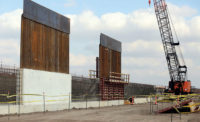Federal courts in California and Texas ruled in early December that $3.6 billion in military construction funds cannot be diverted by the Trump administration to build 175 miles of wall along the southern border of the U.S.
In related actions, the U.S. Defense Dept.’s inspector general will audit a $400-million border wall contract just awarded by the U.S. Army Corps of Engineers to North Dakota contractor Fisher Sand and Gravel to determine if it met solicitation standards, and on Dec. 19, Sen. Jack Reed (D-R.I.), the top Democrat on the Senate Armed Services Committee, requested a probe of border barrier procurement by the U.S. Government Accountability Office.
The IG audit comes after Rep. Bernie Thompson (D-Miss.), chairman of the House Homeland Security Committee, raised concern of possible White House-inappropriate influence. The IG also said it will examine military border activities, including whether the “actual use of funds complies with federal law.” In his letter.
Reed wants GAO to determine if Corps or Defense Dept. officials had any "direct or indirect" contact with "any other administration officials and bidders related to border wall contract awards," says his letter.
A GAO spokesman told ENR that the agency is still reviewing the request and has not yet decided to take it on
What Judges Said
A federal judge in Oakland, Calif., Haywood Gilliam, said Dec. 11 that President Donald Trump’s use of the National Emergencies Act in February to divert funds to build 11 border barriers was unlawful, as did U.S. district court judge David Briones in El Paso, Texas, who issued a final nationwide injunction order on Dec. 10 against using the milcon funds.
The California judgment pertains to two lawsuits, one by nine states claiming diverted funds delayed military projects—California, Colorado, Hawaii, Maryland, New Mexico, New York, Oregon, Wisconsin and Virginia—and the other by the Sierra Club and southern border communities. El Paso County and the Border Network for Human Rights filed the Texas lawsuits.
The California court said the emergency law was not intended to resolve policy disputes between the president and Congress. It said Trump used executive power to declare a national emergency to reallocate funds after Congress authorized $1.37 billion for wallbuilding rather than $5.7 billion he requested. A primary issue the court addressed was Section 2808 of the emergency law that links a national emergency to armed forces and allows military projects not otherwise authorized. It has been used for aircraft hangers, barracks, runways and wastewater treatment plants, the court said.
“A president has never before invoked Section 2808 to secure funding for projects that Congress specifically declined to fund,” Gilliam said. “Yet here the president has been explicit in his intention to obtain funds for border barrier construction, with or without Congress.”
He said the 11 projects are not necessary to support the armed forces.
Gilliam said the court would not interpret Section 2808 to provide the Secretary of Defense “with almost limitless authority” to use funds for Dept. of Homeland Security projects, nor allow fund transfer by “reclassifying large swaths of the southern border as military installations.” The court stayed its permanent injunction pending appeal.
Briones also denied on Dec. 17 the government’s request to kift a permanent ban on using Section 2808 funding to build the border wall.
The Justice Dept. had argued that the skills and resources of the armed forces are necessary to support DHS at the border and that border barriers will allow DOD to support to do so more efficiently.
Meanwhile, the San Francisco appeals court is reviewing a separate case linked to $2.5 billion in antidrug funds being used for border walls. Gilliam temporarily barred use of those funds in a previous order, but the U.S. Supreme Court stayed the injunction in July until the appellate court rules.






Post a comment to this article
Report Abusive Comment